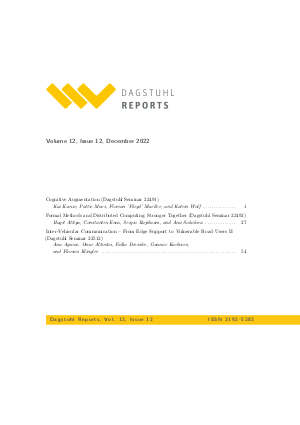Dagstuhl Reports, Volume 12, Issue 12
-
Part of:
Volume:
Dagstuhl Reports, Volume 12
Journal: Dagstuhl Reports (DagRep)

Event
- Dagstuhl Seminars 22491, 22492, 22512
Publication Details
- published at: 2023-05-05
- Publisher: Schloss Dagstuhl – Leibniz-Zentrum für Informatik
- DBLP: db/journals/dagstuhl-reports/dagstuhl-reports12
Access Numbers
- Detailed Access Statistics available here
-
Total Accesses (updated on a weekly basis)
0Documents
Documents
Dagstuhl Reports, Volume 12, Issue 12, December 2022, Complete Issue
Abstract
Cite as
Dagstuhl Reports, Volume 12, Issue 12, pp. 1-75, Schloss Dagstuhl – Leibniz-Zentrum für Informatik (2023)
Copy BibTex To Clipboard
@Article{DagRep.12.12,
title = {{Dagstuhl Reports, Volume 12, Issue 12, December 2022, Complete Issue}},
pages = {1--75},
journal = {Dagstuhl Reports},
ISSN = {2192-5283},
year = {2023},
volume = {12},
number = {12},
publisher = {Schloss Dagstuhl -- Leibniz-Zentrum f{\"u}r Informatik},
address = {Dagstuhl, Germany},
URL = {https://drops.dagstuhl.de/entities/document/10.4230/DagRep.12.12},
URN = {urn:nbn:de:0030-drops-178429},
doi = {10.4230/DagRep.12.12},
annote = {Keywords: Dagstuhl Reports, Volume 12, Issue 12, December 2022, Complete Issue}
}
Dagstuhl Reports, Table of Contents, Volume 12, Issue 12, 2022
Abstract
Cite as
Dagstuhl Reports, Volume 12, Issue 12, pp. i-ii, Schloss Dagstuhl – Leibniz-Zentrum für Informatik (2023)
Copy BibTex To Clipboard
@Article{DagRep.12.12.i,
title = {{Dagstuhl Reports, Table of Contents, Volume 12, Issue 12, 2022}},
pages = {i--ii},
journal = {Dagstuhl Reports},
ISSN = {2192-5283},
year = {2023},
volume = {12},
number = {12},
publisher = {Schloss Dagstuhl -- Leibniz-Zentrum f{\"u}r Informatik},
address = {Dagstuhl, Germany},
URL = {https://drops.dagstuhl.de/entities/document/10.4230/DagRep.12.12.i},
URN = {urn:nbn:de:0030-drops-178435},
doi = {10.4230/DagRep.12.12.i},
annote = {Keywords: Table of Contents, Frontmatter}
}
Cognitive Augmentation (Dagstuhl Seminar 22491)
Abstract
Cite as
Kai Kunze, Pattie Maes, Florian `Floyd' Mueller, and Katrin Wolf. Cognitive Augmentation (Dagstuhl Seminar 22491). In Dagstuhl Reports, Volume 12, Issue 12, pp. 1-26, Schloss Dagstuhl – Leibniz-Zentrum für Informatik (2023)
Copy BibTex To Clipboard
@Article{kunze_et_al:DagRep.12.12.1,
author = {Kunze, Kai and Maes, Pattie and Mueller, Florian `Floyd' and Wolf, Katrin},
title = {{Cognitive Augmentation (Dagstuhl Seminar 22491)}},
pages = {1--26},
journal = {Dagstuhl Reports},
ISSN = {2192-5283},
year = {2023},
volume = {12},
number = {12},
editor = {Kunze, Kai and Maes, Pattie and Mueller, Florian `Floyd' and Wolf, Katrin},
publisher = {Schloss Dagstuhl -- Leibniz-Zentrum f{\"u}r Informatik},
address = {Dagstuhl, Germany},
URL = {https://drops.dagstuhl.de/entities/document/10.4230/DagRep.12.12.1},
URN = {urn:nbn:de:0030-drops-178445},
doi = {10.4230/DagRep.12.12.1},
annote = {Keywords: augmented humans, augmented reality, wearable computing}
}
Formal Methods and Distributed Computing: Stronger Together (Dagstuhl Seminar 22492)
Abstract
Cite as
Hagit Attiya, Constantin Enea, Sergio Rajsbaum, and Ana Sokolova. Formal Methods and Distributed Computing: Stronger Together (Dagstuhl Seminar 22492). In Dagstuhl Reports, Volume 12, Issue 12, pp. 27-53, Schloss Dagstuhl – Leibniz-Zentrum für Informatik (2023)
Copy BibTex To Clipboard
@Article{attiya_et_al:DagRep.12.12.27,
author = {Attiya, Hagit and Enea, Constantin and Rajsbaum, Sergio and Sokolova, Ana},
title = {{Formal Methods and Distributed Computing: Stronger Together (Dagstuhl Seminar 22492)}},
pages = {27--53},
journal = {Dagstuhl Reports},
ISSN = {2192-5283},
year = {2023},
volume = {12},
number = {12},
editor = {Attiya, Hagit and Enea, Constantin and Rajsbaum, Sergio and Sokolova, Ana},
publisher = {Schloss Dagstuhl -- Leibniz-Zentrum f{\"u}r Informatik},
address = {Dagstuhl, Germany},
URL = {https://drops.dagstuhl.de/entities/document/10.4230/DagRep.12.12.27},
URN = {urn:nbn:de:0030-drops-178452},
doi = {10.4230/DagRep.12.12.27},
annote = {Keywords: automated verification and reasoning, concurrent data structures and transactions, distributed algorithms, large-scale replication}
}
Inter-Vehicular Communication - From Edge Support to Vulnerable Road Users II (Dagstuhl Seminar 22512)
Abstract
Cite as
Ana Aguiar, Onur Altintas, Falko Dressler, Gunnar Karlsson, and Florian Klingler. Inter-Vehicular Communication - From Edge Support to Vulnerable Road Users II (Dagstuhl Seminar 22512). In Dagstuhl Reports, Volume 12, Issue 12, pp. 54-73, Schloss Dagstuhl – Leibniz-Zentrum für Informatik (2023)
Copy BibTex To Clipboard
@Article{aguiar_et_al:DagRep.12.12.54,
author = {Aguiar, Ana and Altintas, Onur and Dressler, Falko and Karlsson, Gunnar and Klingler, Florian},
title = {{Inter-Vehicular Communication - From Edge Support to Vulnerable Road Users II (Dagstuhl Seminar 22512)}},
pages = {54--73},
journal = {Dagstuhl Reports},
ISSN = {2192-5283},
year = {2023},
volume = {12},
number = {12},
editor = {Aguiar, Ana and Altintas, Onur and Dressler, Falko and Karlsson, Gunnar and Klingler, Florian},
publisher = {Schloss Dagstuhl -- Leibniz-Zentrum f{\"u}r Informatik},
address = {Dagstuhl, Germany},
URL = {https://drops.dagstuhl.de/entities/document/10.4230/DagRep.12.12.54},
URN = {urn:nbn:de:0030-drops-178466},
doi = {10.4230/DagRep.12.12.54},
annote = {Keywords: 5G/6G, bicyclists, cooperative driving, edge computing, intelligent transportation systems, pedestrians, tactile internet, V2X, vehicle-to-vehicle communication, vulnerable road users}
}